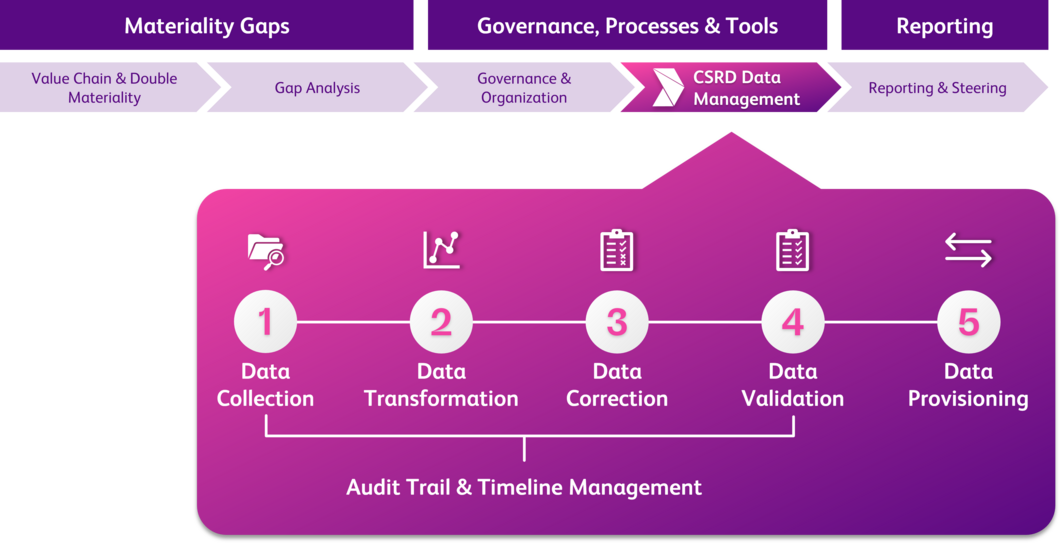
CSRD Data Management
Worry-Free CSRD Reporting with Accurate and Efficient CSRD Data Management

Worry-Free CSRD Reporting with Accurate and Efficient CSRD Data Management
Structured data collection is difficult due to the numerous data sources, various data types, and multiple contributors and stakeholders which are usually distributed across locations and departments. The use of unstructured data like Excel sheets without any tracking makes it additionally challenging to manage and ensure data consistency.
The absence of data validation processes and the need for data in specific formats lead to significant risks in reporting incorrect data. Approval processes can get overlooked, and there is a lack of transparency, making it difficult to maintain accountability and ensure the accuracy of the reported information. Common CSRD suits are not designed to handle data quality aspects, leaving these issues unaddressed.
Manual data handling due to the lack of validation and unstructured data is error-prone and time-consuming. This tedious work lowers motivation and productivity among employees, making it an inefficient approach to managing CSRD compliance.

Data Quality Navigator supports the CSRD data preparation with timeline management, collection workflows, CSRD data transformation templates, CSRD data correction and CSRD data validation checks, all while adhering to auditable standards. Governed by a time-bound project management framework, the Data Quality Navigator provides clean, accurate CSRD data serving either as the vital basis for internal report creation or as input to a CSRD reporting tool.
The Data Quality Navigator offers a timeline monitor and management dashboards to track the progress of the CSRD initiative against milestones, providing visibility into each phase of the CSRD data lifecycle and enabling proactive management.
During data collection, contributors upload their data to the Data Quality Navigator, where it is automatically validated and cleansed, eliminating errors from the beginning. An overview report provides insights into the status and resolved issues.
During CSRD data transformation, automated rules are applied to identify duplicates, allowing users to deduplicate data in the Data Quality Navigator. This automated approach streamlines the process, mitigating errors and enhancing efficiency.
During upload and transformation, CSRD report data is automatically analyzed to detect inconsistencies and technical errors. Identified errors are corrected automatically, reducing manual effort immensely and ensuring data integrity from the start.
For data findings that require human review, workflow management reports replace manual, spreadsheet-based validation. Validators can efficiently review flagged data, track the validation status, and ensure an audit-proof process.
In the data provisioning phase, validators upload the validated data into the CSRD reporting software. Previous validations ensure the data is error-free and correctly formatted for an easy upload.
The Data Quality Navigator maintains comprehensive records of all changes made throughout the data lifecycle, including detailed logs of user actions, ensuring a transparent audit trail and meeting audit requirements.

CSRD reporting has not just become a compliance requirement but a strategic asset. However, the path to achieving accurate and reliable CSRD reporting results can be complex and time intensive.
The pressure on companies to establish sustainable and socially responsible business practices is growing. Amongst the primary driving factors are social change and governmental regulations – more and more accompanied by a genuine ambition of organizations to improve.
Read more!